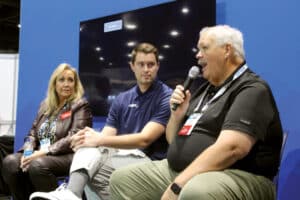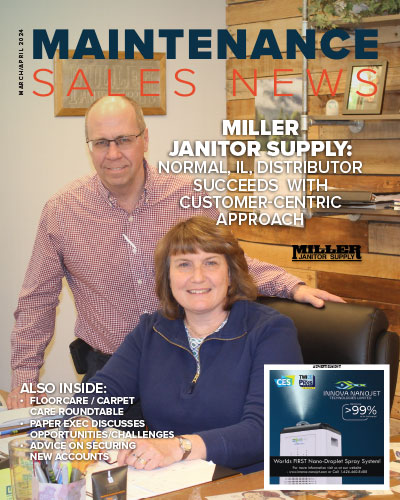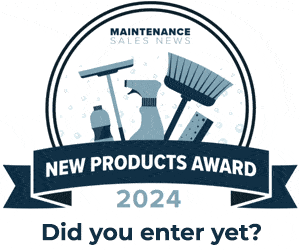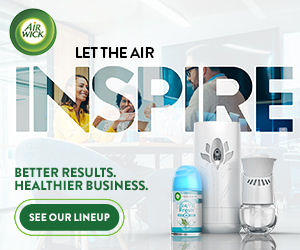ISSA Show Panel Focuses On Hot Topics, Challenges And Opportunities
By Harrell Kerkhoff Maintenance Sales News Editor
 Rapid change continues to challenge the North American cleaning industry, involving professionals who work in distribution, manufacturing, building service contracting and residential cleaning. Discussing today’s changes, challenges and opportunities were three panelists who participated in an industry leaders roundtable presentation. The event was part of the 2022 ISSA Show North America, held in October at McCormick Place, Chicago, IL.
Rapid change continues to challenge the North American cleaning industry, involving professionals who work in distribution, manufacturing, building service contracting and residential cleaning. Discussing today’s changes, challenges and opportunities were three panelists who participated in an industry leaders roundtable presentation. The event was part of the 2022 ISSA Show North America, held in October at McCormick Place, Chicago, IL.
The ISSA Show panelists presented their views related to the state-of-the-industry and public policy, among other issues. Members of the panel were:
- Ailene Grego, president/CEO of SouthEast LINK, a janitorial supply and cleaning products distributor, and president/CEO of American Formula, a manufacturer of cleaning chemicals. Both companies are located in Atlanta, GA;
- Justin Clegg, founder/CEO of Allset, a software company that focuses on helping businesses streamline payments and simplify text messaging and communication experiences, located in Lehi, UT; and,
- Royce Ard, owner of My Amazing Maid, a residential cleaning company, located in Columbus, GA.
The moderator for the panel presentation was John Nothdurft, ISSA director of government affairs.
“Our panelists are from across the cleaning spectrum,” Nothdurft said. “We wanted to cover all aspects of the cleaning industry, and talk about the issues facing each group.”
Question: There are so many challenges in business today, such as the supply chain, labor and inflation. What are the top issues either currently, or you foresee, impacting the bottom line of your companies?
Grego: “I’m not sure we have enough time to address all of today’s challenges. Labor has been a big issue for us, but that seems to be correcting itself. It’s now easier to find people, but still difficult to find the right people.
“Our biggest issues right now are price increases, inflation and the supply chain. It seems like certain supply chain problems that we had before, such as with plastics and paper, are starting to become rectified. However, we are still having really big issues with anything that has a chip, such as equipment and parts. It can take four to six months, if not more, to get certain types of equipment.
“Price increases are probably our No. 1 challenge. The main problem is with locked-in customer contracts. Margins are being decreased within those contracts due to rising prices. I would recommend to all distributors that they re-evaluate their new contracts with customers before signing.”
Clegg: “(Allset) is a venture backed startup, which means the success of our business is contingent on the capital that is raised, so that we can grow at scale. We have had to shift our focus this year from growth to profitability and cash preservation. During a recession, or when there are rumors of recession, investor concerns start to creep up. Our job (at Allset) is to become extremely disciplined, capital efficient and think of ways to become default-alive as a business, as opposed to default-dead.
“We are also always thinking about opportunities to find talent, as we are in a very competitive landscape when it comes to attracting talent. I think all of us (on the panel) experience the challenges of finding talent. Other challenges have to do with distribution, and how to get products into the market fast enough and quickly scaled. Those are the things that keep us up at night.”
Ard: “We are a service business, so everything rolls around labor. We are about 18 to 24 months into a pretty tough labor market. It has started to change for the better — going from not being able to find anybody to hire, to receiving 50 to 60 replies. The challenge now is to find quality people.
“There are a couple of ways to approach a recessionary-type environment when working in the service business. Obviously, you have to retain clients. Also, it’s hard to cut a lot out of costs, as 50 percent of our revenue goes back into labor. Therefore, we must find other ways to be more efficient.
“We have tried to be very selective on the labor front, which means we are not carrying a heavy load of trainees. That has been a big win for us, and will be huge going into any economic situation that may come up in the near future.”
 Question: Coming out of the pandemic, it can be hard to figure out where future sales are going to take place. Do you see any changes with demand coming up regarding the products and/or services your company provides within the cleaning industry?
Question: Coming out of the pandemic, it can be hard to figure out where future sales are going to take place. Do you see any changes with demand coming up regarding the products and/or services your company provides within the cleaning industry?
Ard: “Demand for residential cleaning took a big hit during the pandemic. We lost 40 percent of our client base overnight. We are not all the way back, yet. Some of that is by design, and some of that is due to the current labor shortage.
“Just as we have to look for a better quality candidate to hire, we also have to look for a better quality client. We have raised prices several times while finding, and working with, new clients. Doing so is a good screening tool.
“We did realize something interesting during the pandemic. The 60 percent of clients who stayed with us did so because they truly love what we do. That provides us with a very good baseline to grow, as we seek new clients.
“There are no ‘bad’ clients in some respects, as revenue is revenue, but there are clients who take a lot of work and clients who don’t — which is why we are trying to be more selective.”
Clegg: “More people continue to work from home, and therefore, there is an increased importance placed on home cleaning. Because of that, I feel the residential cleaning industry will continue to grow.
“If there has been any ‘benefit’ to the pandemic, it’s more people now view the cleaning service business as necessary rather than a luxury. The focus now is building and maintaining healthy and safe environments. That is a positive.”
Grego: “I do feel the level of cleanliness changed with the pandemic, as a heightened awareness was placed on cleaning for health. One thing that is concerning is once people start getting back to their regular routines, they may go back to pre-pandemic cleaning practices. That is a problem, as it means they will be unprepared for the next (pandemic) — and there will be a next pandemic. Look at monkeypox, it’s starting to gain momentum.
“We have to get back to the understanding that it’s more important to clean for health rather than aesthetics. I would recommend taking a look at the new ISSA’s Rethink What Clean Means (rethinkclean.org) campaign, which focuses on the importance of cleanliness as it relates to health.”
Question: With many companies downsizing the amount of space they need at their facilities, and with more employees working from home, do you see the distribution and manufacturing sectors growing or remaining flat?
Grego: “Right now, it’s flat. That is mainly due to the impact of price increases, which leads to the inability to react efficiently and effectively when locked into current customer contracts.
“It also goes back to the different levels of cleanliness, and helping customers understand why it’s important to clean for health rather than just ‘looking pretty.’
“I represent a smaller distributorship, compared to some of the bigger companies here (at the ISSA Show). We have to compete against those companies. What helps make our distributorship different is that we don’t worry as much about a product’s price. Instead, we are looking for innovation, technology and something a little different to offer our customers.
“We continue to look for ways to be unique and sustainable. Innovation and technology are important, helping our customers reduce their labor costs. If we can help our customers reduce their labor, it doesn’t matter how much they pay for a product.”
Question: The last week of March is National Cleaning Week. One of events this year is the ISSA Clean Advocacy Summit, scheduled for March 30-31, 2023. The summit provides cleaning industry professionals with an opportunity to meet with their elected officials in Washington, D.C., to discuss important issues. All three panelists attended last year’s summit. What was your experience with that event?
Grego: “I would urge everybody to take advantage of that opportunity. Royce (Ard) and I are both from Georgia, and although we may have different issues to discuss, we both had the opportunity to meet with our state’s elected officials in Washington, D.C., and talk about what is important for our companies.”
Clegg: “Kudos to ISSA with putting this summit together. It’s good to be aligned with an organization that helps its members focus on government initiatives.
“One thing I can confirm, after taking part is last year’s summit, is that we (cleaning industry participants) were heard. We all have an innate sense of wanting to be heard, especially when it comes to our unique challenges in businesses. ISSA, and its government relations program, really positioned summit participants — representing distribution, manufacturing, residential cleaning, commercial cleaning and even a software company — to share and advocate for the industry.”
Ard: “I thought it was a great experience from a lot of fronts. No. 1, (ISSA) did a great job bringing people in to meet with us on the first day of the summit, before we actually went to Capitol Hill. That gave us an idea of what was ahead. When we finally went to our appointments, we were prepared for what we wanted to say. It was excellent from that standpoint.
“One thing I learned is that Washington, D.C. is really run by a bunch of people whose average age is 28. That is the staff (of elected officials). They come from all over the United States, and represent the best part of our government. They are there for the right reasons. When you talk to them (on the side), they will let you know, ‘I just want to come here to make a difference.’
“When my group met with a staff member working for our (U.S.) senator from Georgia, he said, ‘I need you to tell me your stories. Tell me how you are affected by this and that. Your stories give me context for the words in a possible bill.’ I thought that was very insightful, because (staff members) look at bills drafted by different committees all of the time, but don’t always have the stories behind those bills.
“One message we gave them was (with residential cleaning), we really get to know our customers well. A lot of what we do is help people, such as senior citizens, stay in their homes. Most of our customers do not look at residential cleaning as a luxury item. It was therefore important to let (elected officials) know who the people really are within our customer base.”
Question: Do you have any predictions for 2023, related to your business and/or the industry?
Clegg: “I feel more people are going to move toward eco-friendly and green cleaning. That will continue to be an initiative. I also see interesting trends taking place, involving innovation and technology, that will help improve employee retention and training.
“I do hope people within the cleaning industry look around at all of the on-demand delivery services now available. For example, you can use an app to have your groceries delivered within 30 minutes. That is where the future is heading, and I feel the (cleaning) industry has some catching up to do. It’s about 5 to 10 years behind.”
Ard: “I believe the house cleaner, as the industry becomes more professionalized, will be seen as a key part of the household. That involves not only maintaining the house, but helping the occupant(s) remain in that house longer. One of the things we see (in the residential cleaning industry), is an older person in the home who does not have a family member close by. Therefore, the house cleaner is sometimes the first person who can recognize if there is a problem with the occupant.”
Grego: “I agree with all of the predictions (from Clegg and Ard), and would add the importance of companies (within the cleaning industry) providing more online information. There used to be the thought, ‘Don’t give away all of our secrets.’ I don’t think that applies anymore within today’s information age. You can go to YouTube and learn how to fix just about anything. As a result, it’s important for companies to provide more online training and educational videos.
“It’s also important to remember that there are many younger people coming into our industry — and that is a must. In order to attract those people, it’s important to make information readily accessible to them, with the help of today’s technology. That is how they want to communicate.”







